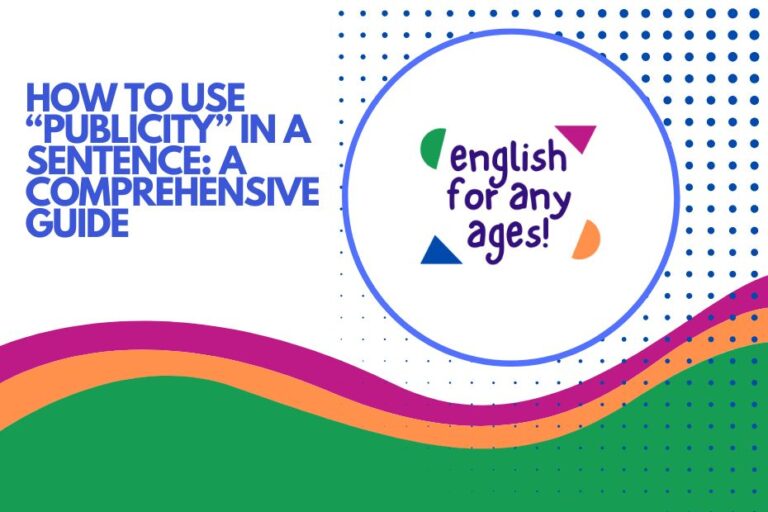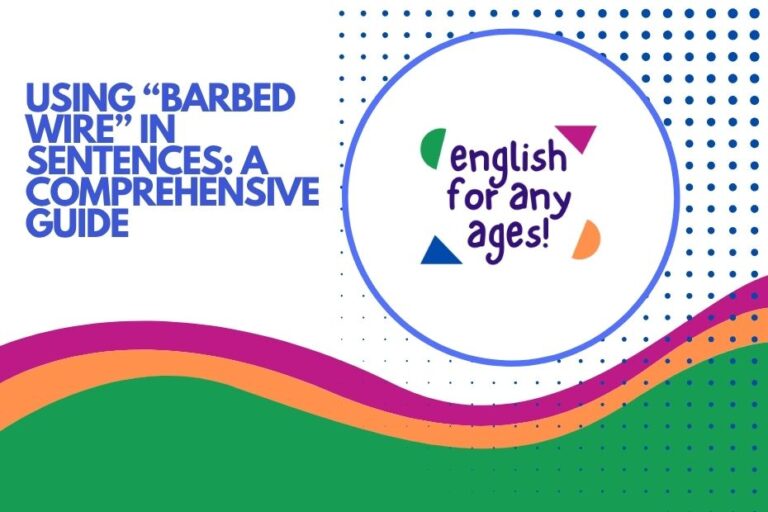How to Use “Shut Up” Correctly in a Sentence: A Grammar Guide
Understanding how to use the phrase “shut up” correctly is crucial for effective communication in English. While seemingly simple, its usage is nuanced and heavily dependent on context, tone, and relationship between speakers.
This article will provide a comprehensive guide to the various ways “shut up” can be employed, its potential implications, and how to navigate its use appropriately. Whether you are an ESL learner or a native speaker seeking to refine your understanding, this guide will offer valuable insights into the proper and improper uses of this phrase.
Also, you can learn everything from the basic definition and grammatical function of “shut up” to its use in various contexts, potential for offense, and alternatives. We will explore its structure, provide numerous examples, and offer practice exercises to solidify your understanding.
By the end of this article, you will be equipped to use “shut up” appropriately and understand its impact in different social situations.
Table of Contents
- Definition of “Shut Up”
- Structural Breakdown
- Types and Categories of Usage
- Examples of “Shut Up” in Sentences
- Usage Rules
- Common Mistakes
- Practice Exercises
- Advanced Topics
- FAQ
- Conclusion
Definition of “Shut Up”
“Shut up” is a phrasal verb in English, meaning to stop talking or to cause someone to stop talking. It can function as an imperative, commanding silence, or as an interjection, expressing disbelief, surprise, or excitement.
Its primary function is related to ceasing or preventing speech.
Classified as a phrasal verb, “shut up” combines the verb “shut” with the particle “up.” The particle modifies the verb’s meaning, transforming “shut” (close) into “shut up” (stop talking). The phrase’s usage varies significantly based on context and intonation, ranging from a rude command to a playful expression of surprise.
Understanding these nuances is crucial for effective communication.
The context in which “shut up” is used dramatically affects its interpretation. In a formal setting, its use is generally considered inappropriate and impolite.
However, among close friends, it can be used playfully or even affectionately. The tone of voice, facial expressions, and the overall relationship between the speakers all contribute to the perceived meaning and impact of the phrase.
It is important to consider these contextual factors before using this potentially offensive phrase.
Structural Breakdown
The phrase “shut up” consists of two parts: the verb “shut” and the particle “up.”
- Shut: This is the main verb, meaning to close or to stop something from operating. In the context of “shut up,” it implies stopping the action of speaking.
- Up: This is a particle that modifies the verb “shut.” When combined, “shut up” acquires the specific meaning of ceasing or preventing speech.
The structure is simple, yet the meaning is heavily influenced by intonation and context. The placement of emphasis can alter its interpretation.
For example, stressing “shut” can make the command more forceful, while emphasizing “up” can soften the tone slightly. Understanding these subtle variations is key to using the phrase effectively and avoiding misunderstandings.
The phrase typically does not take a direct object when used intransitively (e.g., “Shut up!”). However, it can be used transitively with an indirect object (e.g., “Shut him up!”).
The phrasal verb structure of “shut up” follows the pattern of verb + particle, which is common in English. This structure allows for a wide range of meanings to be conveyed through the combination of simple words.
Other examples include “look up,” “break down,” and “turn on.” Mastering the understanding of phrasal verbs is essential for fluency in English, as they often carry idiomatic meanings that cannot be deduced from the individual words alone. The structure is inflexible; the particle ‘up’ cannot be separated from ‘shut’ in this context: *”Shut quickly up!”* is incorrect.
Types and Categories of Usage
“Shut up” has two primary categories of usage: as an imperative and as an interjection. Each category carries distinct connotations and is used in different contexts.
Imperative “Shut Up”
As an imperative, “shut up” is a direct command to stop talking. This usage is generally considered rude and aggressive, especially when directed at someone in a position of authority or someone you don’t know well.
Its severity can be slightly mitigated by tone of voice and context, but it remains a potentially offensive phrase.
The imperative form of “shut up” is typically used when the speaker is frustrated, angry, or annoyed. It conveys a strong desire for the other person to be silent.
While it can be used in jest among close friends, it’s crucial to be aware of the potential for misinterpretation and offense. In most formal or professional settings, using “shut up” as an imperative is highly inappropriate.
Consider the power dynamics involved when using “shut up” as an imperative. A superior telling a subordinate to “shut up” is significantly different from a friend saying it to another friend.
The potential for abuse and disrespect is higher when there is an imbalance of power. Therefore, it’s essential to exercise caution and consider the implications before using this phrase in a commanding manner.
Interjection “Shut Up!”
As an interjection, “shut up” expresses surprise, disbelief, or excitement. This usage is less aggressive and can even be playful, particularly among close friends.
The tone of voice and facial expressions are crucial in conveying the intended meaning.
When used as an interjection, “shut up” is often a reaction to unexpected or shocking news. It’s a way of expressing disbelief or amazement.
For example, if someone tells you they won the lottery, you might exclaim, “Shut up! No way!” In this context, it’s not a command to be silent but rather an expression of surprise.
The interjectory use of “shut up” can also convey excitement, particularly when sharing good news or experiencing a positive event. For example, if your friend tells you they’re getting married, you might respond with an enthusiastic, “Shut up!
That’s amazing!” Again, the tone of voice and facial expressions are crucial in conveying the intended excitement and preventing misinterpretation.
Examples of “Shut Up” in Sentences
To illustrate the different uses of “shut up,” here are several examples categorized by function.
Imperative Examples
The following table provides examples of “shut up” used as an imperative, highlighting the varying degrees of rudeness depending on context and tone.
| Sentence | Context | Tone |
|---|---|---|
| “Shut up! I’m trying to concentrate.” | Someone is making noise while another person is working. | Angry, impatient |
| “Shut up, you’re being annoying.” | Someone is irritating another person. | Frustrated, irritated |
| “Just shut up and listen.” | Someone is interrupting a speaker. | Impatient, demanding |
| “Shut up! I don’t want to hear it.” | Someone is refusing to listen to an explanation. | Aggressive, dismissive |
| “Shut up, already! You’ve been talking for hours.” | Someone is complaining about another person’s excessive talking. | Exasperated, annoyed |
| “Shut up! Can’t you see I’m busy?” | Someone is trying to work and is being disturbed. | Irritated, stressed |
| “Shut up, will you! I have a headache.” | Someone is suffering from a headache and is sensitive to noise. | Annoyed, in pain |
| “Shut up! I’m on the phone.” | Someone is trying to have a conversation and is being interrupted. | Impatient, distracted |
| “Shut up! You’re ruining the movie.” | Someone is talking during a movie screening. | Annoyed, critical |
| “Shut up! Nobody cares about your opinion.” | Someone is being dismissive and rude to another person. | Aggressive, insulting |
| “Shut up! I’m not in the mood to argue.” | Someone is avoiding a confrontation. | Defensive, dismissive |
| “Shut up, please! I’m begging you.” | Someone is desperately trying to stop another person from talking. | Desperate, pleading |
| “Shut up! I can’t stand your voice.” | Someone is expressing extreme dislike for another person’s voice. | Aggressive, insulting |
| “Shut up! You’re embarrassing me.” | Someone is feeling ashamed or humiliated by another person’s behavior. | Embarrassed, annoyed |
| “Shut up! I’m trying to sleep.” | Someone is trying to rest and is being disturbed by noise. | Irritated, tired |
| “Shut up! Stop spreading rumors.” | Someone is trying to stop another person from gossiping. | Angry, condemning |
| “Shut up! You’re making things worse.” | Someone is trying to prevent another person from escalating a situation. | Concerned, exasperated |
| “Shut up! I’m not interested in your excuses.” | Someone is refusing to accept another person’s explanations. | Dismissive, unsympathetic |
| “Shut up! You’re driving me crazy.” | Someone is feeling overwhelmed and irritated by another person’s behavior. | Frustrated, stressed |
| “Shut up! Just leave me alone.” | Someone is seeking solitude and wants to be left undisturbed. | Defensive, withdrawn |
| “Shut up! You’re lying.” | Someone is accusing another person of dishonesty. | Aggressive, accusatory |
| “Shut up! I know the truth.” | Someone is asserting their knowledge and dismissing another person’s claims. | Confident, challenging |
| “Shut up! Stop being so dramatic.” | Someone is criticizing another person for exaggerating. | Annoyed, dismissive |
| “Shut up! You’re scaring me.” | Someone is feeling frightened by another person’s words or actions. | Scared, anxious |
As demonstrated in the table, the imperative use of “shut up” is generally harsh and should be used with extreme caution. The context and tone can slightly modify its severity, but it remains a potentially offensive statement.
Interjection (Disbelief) Examples
The following table illustrates “shut up” used as an interjection to express disbelief or surprise. Note the shift in tone compared to the imperative examples.
| Sentence | Context | Tone |
|---|---|---|
| “Shut up! You’re getting married?” | Reacting to the news of a friend’s engagement. | Surprised, excited |
| “Shut up! You won the lottery?” | Reacting to the news of someone winning the lottery. | Shocked, incredulous |
| “Shut up! That’s unbelievable.” | Reacting to a surprising or shocking story. | Amazed, disbelieving |
| “Shut up! I don’t believe it.” | Expressing strong disbelief in something. | Skeptical, surprised |
| “Shut up! Are you serious?” | Seeking confirmation of surprising news. | Incredulous, curious |
| “Shut up! No way!” | Expressing strong disbelief or amazement. | Astonished, disbelieving |
| “Shut up! You’re kidding me!” | Expressing disbelief and amusement. | Playful, incredulous |
| “Shut up! I can’t believe it’s true.” | Struggling to accept surprising news. | Astonished, overwhelmed |
| “Shut up! That’s impossible.” | Expressing strong disbelief in something. | Skeptical, dismissive |
| “Shut up! You’re pulling my leg.” | Accusing someone of joking or teasing. | Amused, skeptical |
| “Shut up! You got the job?” | Reacting to the news of someone getting a job. | Surprised, happy |
| “Shut up! You’re moving to Italy?” | Reacting to the news of someone relocating. | Surprised, curious |
| “Shut up! You met a celebrity?” | Reacting to the news of someone meeting a celebrity. | Excited, impressed |
| “Shut up! You’re pregnant?” | Reacting to the news of a pregnancy. | Surprised, joyful |
| “Shut up! You bought a house?” | Reacting to the news of someone buying a house. | Surprised, impressed |
| “Shut up! You wrote a book?” | Reacting to the news of someone writing a book. | Surprised, impressed |
| “Shut up! You climbed Mount Everest?” | Reacting to the news of someone achieving a great feat. | Amazed, impressed |
| “Shut up! You speak fluent Japanese?” | Reacting to the news of someone’s impressive skill. | Surprised, impressed |
| “Shut up! You’re opening a restaurant?” | Reacting to the news of someone starting a business. | Surprised, supportive |
| “Shut up! You won an award?” | Reacting to the news of someone receiving an award. | Surprised, proud |
| “Shut up! You’re going to space?” | Reacting to the news of someone traveling to space. | Amazed, astonished |
| “Shut up! You invented something?” | Reacting to the news of someone’s invention. | Amazed, impressed |
| “Shut up! You adopted a penguin?” | Reacting to the news of someone’s unusual adoption. | Amazed, amused |
| “Shut up! You found a treasure?” | Reacting to the news of someone finding treasure. | Amazed, excited |
In these examples, “shut up” is not a command but an exclamation expressing surprise or disbelief. The tone is typically playful or excited.
Interjection (Excitement) Examples
The following table illustrates “shut up” used as an interjection to express excitement or joy.
| Sentence | Context | Tone |
|---|---|---|
| “Shut up! That’s the best news ever!” | Reacting to extremely positive news. | Excited, joyful |
| “Shut up! I’m so happy for you!” | Expressing happiness for someone else’s success. | Excited, supportive |
| “Shut up! This is amazing!” | Reacting to a wonderful experience. | Excited, enthusiastic |
| “Shut up! I can’t believe this is happening!” | Expressing excitement and disbelief at a positive event. | Overjoyed, thrilled |
| “Shut up! This is the best day of my life!” | Expressing extreme happiness and excitement. | Ecstatic, elated |
| “Shut up! We actually won!” | Reacting to winning a competition or game. | Triumphant, excited |
| “Shut up! I’m so proud of you!” | Expressing pride and excitement for someone else’s achievement. | Proud, joyful |
| “Shut up! This is a dream come true!” | Reacting to the fulfillment of a long-awaited desire. | Joyful, overwhelmed |
| “Shut up! I can’t contain my excitement!” | Expressing uncontrollable excitement and joy. | Thrilled, exuberant |
| “Shut up! We’re going to Disneyland!” | Reacting to the exciting news of a trip. | Excited, delighted |
| “Shut up! I got a promotion!” | Sharing the exciting news of a career advancement. | Proud, excited |
| “Shut up! I passed the exam!” | Sharing the exciting news of passing an important test. | Relieved, excited |
| “Shut up! I’m going on vacation!” | Sharing the exciting news of an upcoming trip. | Excited, anticipatory |
| “Shut up! I got accepted to college!” | Sharing the exciting news of college acceptance. | Proud, excited |
| “Shut up! I’m starting my own business!” | Sharing the exciting news of entrepreneurship. | Motivated, excited |
| “Shut up! I’m publishing my book!” | Sharing the exciting news of book publication. | Proud, excited |
| “Shut up! I’m running a marathon!” | Sharing the exciting news of a challenging goal. | Determined, excited |
| “Shut up! I’m learning to fly!” | Sharing the exciting news of a new skill. | Enthusiastic, excited |
| “Shut up! I’m buying a boat!” | Sharing the exciting news of a major purchase. | Proud, excited |
| “Shut up! I’m opening an art gallery!” | Sharing the exciting news of a creative venture. | Passionate, excited |
| “Shut up! I’m volunteering abroad!” | Sharing the exciting news of a charitable endeavor. | Fulfilling, excited |
| “Shut up! I’m adopting a pet!” | Sharing the exciting news of pet adoption. | Joyful, excited |
| “Shut up! I’m learning a new language!” | Sharing the exciting news of language acquisition. | Motivated, excited |
| “Shut up! I’m renovating my house!” | Sharing the exciting news of home improvement. | Enthusiastic, excited |
These examples showcase how “shut up” can be used to express genuine excitement and joy, particularly among close friends and family.
Usage Rules
The usage of “shut up” is governed by several key rules, primarily related to context, tone, and the relationship between speakers.
- Context is Key: The appropriateness of “shut up” depends heavily on the situation. Formal settings generally prohibit its use, while informal settings allow for more flexibility.
- Tone Matters: The tone of voice can significantly alter the meaning of “shut up.” A playful tone can soften the command, while an angry tone can make it more offensive.
- Relationship Dynamics: The relationship between speakers is crucial. Close friends may use “shut up” playfully, while strangers should avoid it altogether.
- Avoid in Formal Settings: In professional or formal environments, “shut up” is almost always inappropriate. Use more polite alternatives.
- Consider the Impact: Always consider the potential impact of your words. Even if you intend to be playful, “shut up” can be hurtful or offensive.
- Be Mindful of Power Dynamics: Avoid using “shut up” towards someone in a position of authority or someone who is vulnerable.
Understanding these rules is essential for navigating the complexities of using “shut up” appropriately. When in doubt, it’s always best to err on the side of caution and choose a more polite alternative.
It’s also important to consider cultural differences. In some cultures, directness is more accepted, while in others, indirectness is preferred.
Be aware of these cultural nuances when communicating with people from different backgrounds. Using “shut up” inappropriately can lead to misunderstandings and offense, even if it’s not your intention.
Common Mistakes
Several common mistakes occur when using “shut up.” Being aware of these errors can help you avoid miscommunication and offense.
| Incorrect | Correct | Explanation |
|---|---|---|
| “Shut up to him!” | “Tell him to shut up!” | “Shut up” is not typically used with “to” in this context. |
| “Shutting up!” | “I’m shutting up.” | The gerund form requires a subject and auxiliary verb. |
| “You shut up!” (said playfully to a stranger) | (Avoid using “shut up” with strangers) | Using “shut up,” even playfully, can be offensive to strangers. |
| “Shut up!” (said to a boss) | (Use a more polite alternative) | Using “shut up” to a superior is highly inappropriate. |
| “Shut up! It’s not a big deal.” | “Be quiet. It’s not a big deal.” | Using “shut up” dismissively can be hurtful. A softer alternative is better. |
| “Shut up! I don’t care what you think.” | “Please be quiet. Your opinion is not needed at this time.” | The original sentence is unnecessarily rude, while the corrected one is more polite. |
| “Shut up! Stop your nonsense.” | “Please stop talking nonsense.” | The original sentence is harsh, while the corrected one is gentler and more respectful. |
Avoiding these common mistakes will help you use “shut up” more effectively and avoid causing offense. Always consider your audience and the context of the conversation.
Another common mistake is misinterpreting the interjectory use of “shut up” as an imperative. If someone exclaims, “Shut up!
You’re getting married?”, they’re likely expressing surprise and excitement, not commanding silence. Paying attention to tone of voice and facial expressions is crucial for avoiding this misunderstanding.
Practice Exercises
Test your understanding of “shut up” with these practice exercises.
Exercise 1: Identify the correct usage. Choose the sentence where “shut up” is used appropriately.
| Question | Options | Answer |
|---|---|---|
| Which sentence uses “shut up” appropriately? | a) “Shut up!” (said to a police officer) b) “Shut up! You won a million dollars?” (said to a friend) c) “Shut up! I’m trying to sleep.” (said to a baby) |
b) |
| Which sentence uses “shut up” inappropriately? | a) “Shut up! That’s amazing!” (said to a friend) b) “Shut up! I’m on the phone.” (said to a colleague) c) “Shut up! You’re kidding me!” (said to a sibling) |
b) |
| In which context is “shut up” most likely to be acceptable? | a) A business meeting b) A casual conversation with close friends c) A formal presentation |
b) |
| Which sentence demonstrates the imperative use of “shut up”? | a) “Shut up! You’re going to Hawaii?” b) “Shut up! That’s incredible!” c) “Shut up! I can’t hear the TV.” |
c) |
| Which sentence demonstrates the interjectory use of “shut up”? | a) “Shut up! I’m trying to work.” b) “Shut up! You got the job?” c) “Shut up! Stop making noise.” |
b) |
| Which of the following is a polite alternative to “Shut Up!” | a) “Silence!” b) “Could you please be quiet?” c) “Zip it!” |
b) |
| Which scenario is most likely to warrant a playful “Shut up!” | a) Receiving bad news b) Hearing a ridiculous joke c) Being criticized by a superior |
b) |
| Which sentence uses “shut up” in a way that could easily be misinterpreted? | a) “Shut up! That’s awesome!” (said sarcastically) b) “Shut up! I’m so excited!” (said genuinely) c) “Shut up! You’re the best!” (said sincerely) |
a) |
| Which sentence is least likely to cause offense? | a) “Shut up! You’re so stupid.” b) “Shut up! I don’t want to talk to you.” c) “Shut up! You’re getting a puppy?” |
c) |
| Which sentence demonstrates surprise rather than anger? | a) “Shut up! I’m warning you.” b) “Shut up! No way, you’re pregnant?” c) “Shut up! I’ve had enough.” |
b) |
Exercise 2: Rewrite the following sentences using a more polite alternative to “shut up.”
- “Shut up! I’m on an important call.”
- “Shut up! You’re being so annoying.”
- “Shut up! I can’t concentrate with all the noise.”
- “Shut up! Nobody cares about your opinion.”
- “Shut up! Just listen to what I have to say.”
- “Shut up! You’re ruining the surprise.”
- “Shut up! Stop interrupting me.”
- “Shut up! You’re embarrassing me.”
- “Shut up! I don’t want to hear it.”
- “Shut up! Can’t you see I’m busy?”
Answers to Exercise 2: (Examples)
- “Please be quiet; I’m on an important call.”
- “Could you please stop? You’re being a bit annoying.”
- “I’m finding it hard to concentrate with all the noise; could you please be quieter?”
- “I appreciate your input, but your opinion isn’t needed at this time.”
- “Please listen to what I have to say.”
- “You’re ruining the surprise; please be quiet.”
- “Please stop interrupting me.”
- “You’re embarrassing me; could you please stop?”
- “I don’t want to hear it; please stop talking about it.”
- “Can’t you see I’m busy; could you please leave me alone?”
Advanced Topics
For advanced learners, understanding the nuances of “shut up” requires exploring its idiomatic uses and cultural implications in greater depth.
Idiomatic Variations: While “shut up” is the standard form, variations exist, such as “shut your mouth,” which is generally considered more aggressive. Understanding these variations and their associated connotations is important for nuanced communication.
Cultural Sensitivity: The acceptability of “shut up” varies across cultures. In some cultures, directness is more common, while in others, indirectness is preferred. Be mindful of these cultural differences when communicating with people from diverse backgrounds.
Sarcastic Usage: “Shut up” can be used sarcastically to convey the opposite of its literal meaning. For example, saying “Shut up! That’s amazing!” sarcastically might imply disbelief or disapproval. Recognizing sarcastic usage requires understanding tone of voice and context.
Historical Context: The phrase “shut up” has evolved over time, with its connotations shifting depending on societal norms. Understanding this historical context can provide a deeper appreciation for its current usage and potential for offense.
FAQ
Here are some frequently asked questions about using “shut up.”
- Is “shut up” always rude?No, but it is generally impolite. Its rudeness depends on context, tone, and the relationship between speakers. In formal settings, it is almost always inappropriate. However, among close friends, it can be used playfully or to express surprise.
- What are some polite alternatives to “shut up”?Some polite alternatives include “Please be quiet,” “Could you please stop talking?”, “I’m trying to concentrate,” or simply remaining silent to indicate disapproval.
- Can “shut up” be used in a positive way?Yes, as an interjection, “shut up” can express surprise, disbelief, or excitement in a positive way. However, this usage is typically limited to informal settings and close relationships.
- How do I know if someone is offended by “shut up”?Pay attention to their body language, tone of voice, and facial expressions. If they seem uncomfortable, upset, or withdrawn, it’s likely they were offended. Apologize and use a more polite alternative.
- Is “shut your mouth” more offensive than “shut up”?Yes, “shut your mouth” is generally considered more offensive than “shut up” due to its more aggressive and personal nature. It’s best to avoid using “shut your mouth” altogether.
- What should I do if someone tells me to “shut up”?Consider the context and the person’s tone of voice. If it was said playfully, you can respond in kind. If it was said aggressively, you can calmly ask them to speak to you more respectfully or remove yourself from the situation.
- Can “shut up” be used sarcastically?Yes, “shut up” can be used sarcastically to convey the opposite of its literal meaning. However, this usage can be easily misinterpreted, so it’s best to use caution.
- Are there any cultural differences in the interpretation of “shut up”?Yes, the acceptability of “shut up” varies across cultures. In some cultures, directness is more common, while in others, indirectness is preferred. Be mindful of these cultural differences when communicating with people from diverse backgrounds.
Conclusion
Understanding the proper use of “shut up” is essential for effective and respectful communication in English. While seemingly simple, its usage is nuanced and heavily dependent on context, tone, and the relationship between speakers.
This guide has provided a comprehensive overview of its definition, structure, types, usage rules, common mistakes, and advanced topics.
Remember that “shut






